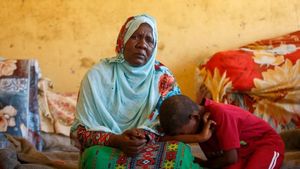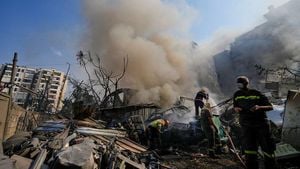ATHENS, Ga. – The murder trial of 26-year-old Jose Ibarra, the man accused of killing nursing student Laken Riley, has revealed shocking details through body camera footage and harrowing audio recordings played during court proceedings. Ibarra faces serious charges including malice murder, and as the trial continues, pieces of evidence are painting a troubling picture of the events surrounding Riley's brutal murder on February 22, 2024.
On the day of the incident, Laken, just 22 years old, was found beaten and lifeless near jogging trails on the University of Georgia's campus after she failed to return from her run. The discovery of her body marked the beginning of Ibarra's legal troubles, as police zeroed in on him shortly after. Testimony from special prosecutor Sheila Ross asserted Ibarra was “hunting” for women when he encountered Riley, leading to a violent struggle where she “fought for her life” before succumbing to asphyxiation and blunt force trauma.
During the proceedings, police body camera footage emerged showing officers questioning Ibarra about various scratches discovered on his arms shortly after the killing. University of Georgia Police Sgt. Joshua Epps noted, “On his left arm, he had a forearm scratch,” which he believed looked like fingernail marks. Ibarra was confronted with the evidence of his injuries, which he could not adequately explain.
Prosecutors presented images of Ibarra’s scratches and bruising from his palms, reinforcing suspicions about his involvement. When pressed about the nature of his injuries, Ibarra gave vague responses, claiming he couldn’t define the source of the scratch on his forearm and attributing redness on his knuckles to the cold weather. These retorts fall flat against evidence collected from the scene and testimonies of eyewitnesses.
Continuing the examination of evidence, Prosecutor Ros and the court evaluated disturbing footage captured by surveillance cameras. Victims’ belongings, including hair from Riley tangled on Ibarra's jacket, were found discarded soon after her death. Ring camera footage depicted the suspect discarding this pivotal piece of clothing just 16 minutes post-murder, drawing the court's attention to the suspicious timeline.
Riley’s tragic death has mobilized voices across the political spectrum, as conservatives, including President-elect Donald Trump, have invoked her case as part of broader discussions about immigration policy reform. Ibarra, identified as an undocumented immigrant from Venezuela, entered the U.S. illegally in 2022, raising urgent questions about illegal immigration and policy responses to such violent crimes. Authorities assert this was not premeditated but rather classified as a “crime of opportunity.”
The courtroom witnessed emotional moments, especially as Riley’s mother, Allyson Phillips, reacted to the graphic audio of law enforcement’s emergency efforts to revive her daughter. The audio recordings featured Sgt. Kenneth Maxwell desperately calling for medical assistance as he attempted CPR on Riley for nearly 20 minutes, stating, “I’m not getting any pulse,” and asserting there was evidence of blunt force trauma.
To add emotional weight to the trial, Ibarra’s wife’s distressing phone calls from jail were shared with the court. During her questioning, she confronted him about the incriminations stemming from the DNA evidence found beneath Riley's fingernails and the jacket discarded near the murder scene. The courtroom heard her voice urge him to disclose the truth, asking, “You’re not gonna come here and lie to me, I know you, you know something.” This encapsulates the weight of familial scrutiny amid severe accusations.
Throughout the trial, Ibarra has maintained his plea of not guilty to all charges, including felony murder and kidnapping. Each testimony and piece of evidence contributes to the whirlwind of emotions swirling around this case—fears, suspicions, and heartbreak. With Judge H. Patrick Haggard presiding over the proceedings, both the defense and prosecution attempt to dissect the tangled web of evidence leading back to the night of the murder.
The trial is not just about the charges against Ibarra but also serves as a grim reminder of the tragic loss of young life and the myriad systemic issues surrounding it. At this point, the courtroom remains tense as every detail presents both sides with their narratives, awaiting the judge's ultimate verdict. Riley’s death and its aftermath underline the pressing issues of campus safety and the long, complicated conversations surrounding immigration policy.
With the trial set to continue, how these events will shape the dialogues on safety and immigration reform remains to be watched closely, as both testimony and evidence weave through the fabric of this case—impacting not just the lives involved but echoing far beyond the courtroom as it resonates with society at large.



